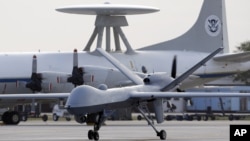From VOA Learning English, this is the TECHNOLOGY REPORT in Special English.
An international rights group has called on world governments to ban fully autonomous weapon systems. Human Rights Watch recently released a report called, “Losing Humanity: The Case against Killer Robots.” It warns that fully autonomous systems could increase risk to civilians during armed conflict.
Militaries around the world are increasingly using Unmanned Aerial Vehicles, also called drones, in modern warfare. They say drones make war safer and more effective. The machines can gather intelligence, help identify targets, and provide deadly force - but only if a human operator gives the order.
Human Rights Watch fears that within 30 years developments in technology could remove the need for human operators. David Mepham is the United Kingdom director of Human Rights Watch.
"One of the things that holds us back from barbarism in contexts of war obviously this distinction between combatants and civilians and we are worried about a robotic weapon of the future not being able to distinguish between a child holding out an ice cream and someone holding a weapon."
The United States and other militaries have stated they have no plans to remove human supervision over the decision to use deadly force.
Human Rights Watch says a treaty would help to guarantee that this does not happen. The group says a ban on what it calls “killer robots” would be similar to current bans on the use of landmines and cluster bombs.
Hugo Rosemont is an independent security expert in Britain. He says discussions about the future of autonomous technology should not be limited to its military uses.
"There also needs to be a public discussion around some of the wider applications, such as in the use of disaster management and humanitarian relief."
For example, France sent remote-controlled robots to Japan last year to help contain the nuclear disaster at the Fukushima power center. This was a job that most people would agree was better left to machines.
In a separate but related story, airplane passengers could soon take to the air without a pilot on the plane. In the next few weeks, a group in Britain will carry out test flights of a Jetstream 31 passenger airplane. A pilot on the ground will control the plane through its autonomous flight system. Safety pilots will be on the aircraft to make sure everything operates correctly.
The tests will show how well the plane navigates and follows the orders it receives from the ground.
The Autonomous Systems Technology Related Airborne Evalutaion and Assessment group is leading the project. The flights are set to leave from the Warton Aerodrome in Lancashire, England.
An international rights group has called on world governments to ban fully autonomous weapon systems. Human Rights Watch recently released a report called, “Losing Humanity: The Case against Killer Robots.” It warns that fully autonomous systems could increase risk to civilians during armed conflict.
Militaries around the world are increasingly using Unmanned Aerial Vehicles, also called drones, in modern warfare. They say drones make war safer and more effective. The machines can gather intelligence, help identify targets, and provide deadly force - but only if a human operator gives the order.
Human Rights Watch fears that within 30 years developments in technology could remove the need for human operators. David Mepham is the United Kingdom director of Human Rights Watch.
"One of the things that holds us back from barbarism in contexts of war obviously this distinction between combatants and civilians and we are worried about a robotic weapon of the future not being able to distinguish between a child holding out an ice cream and someone holding a weapon."
The United States and other militaries have stated they have no plans to remove human supervision over the decision to use deadly force.
Human Rights Watch says a treaty would help to guarantee that this does not happen. The group says a ban on what it calls “killer robots” would be similar to current bans on the use of landmines and cluster bombs.
Hugo Rosemont is an independent security expert in Britain. He says discussions about the future of autonomous technology should not be limited to its military uses.
"There also needs to be a public discussion around some of the wider applications, such as in the use of disaster management and humanitarian relief."
For example, France sent remote-controlled robots to Japan last year to help contain the nuclear disaster at the Fukushima power center. This was a job that most people would agree was better left to machines.
In a separate but related story, airplane passengers could soon take to the air without a pilot on the plane. In the next few weeks, a group in Britain will carry out test flights of a Jetstream 31 passenger airplane. A pilot on the ground will control the plane through its autonomous flight system. Safety pilots will be on the aircraft to make sure everything operates correctly.
The tests will show how well the plane navigates and follows the orders it receives from the ground.
The Autonomous Systems Technology Related Airborne Evalutaion and Assessment group is leading the project. The flights are set to leave from the Warton Aerodrome in Lancashire, England.



